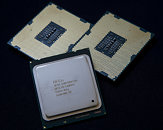Tuesday, March 24th 2015

Intel to Launch Just Two LGA1150 "Broadwell" Parts
In what could be a sign of Intel being stuck with "undigested" Core "Haswell" inventories, BGA chips becoming commonplace for desktop platforms that don't see CPU upgrades, or even "Broadwell" being too short a stopgap between "Haswell" and "Skylake," the company has reportedly decided to launch just two socket LGA1150 Core "Broadwell" parts, when the silicon hits the market towards June.
Built in the 14 nm silicon fab process, "Broadwell" will bring about performance/Watt increments, and Intel doesn't appear to be in the mood to trade those in for higher clock speeds (higher performance out of the box). It's relevant to note here, that the "Broadwell" core is essentially an optical shrink of the "Haswell" CPU architecture to 14 nm, much like "Ivy Bridge" was to "Sandy Bridge," even if the silicon seating the cores itself is much different (meatier iGPU). Intel will be going in with just two parts, both of which are unlocked, for PC enthusiasts to chew on. These include the Core i7-5775C and the Core i5-5675C.Both the i7-5775C and the i5-5675C are quad-core parts, with TDP rated as low as 65W. The i7-5775C offers clock speeds of 3.30 GHz, with 3.70 GHz Turbo Boost, while the i5-5675C offers 3.10 GHz, with 3.60 GHz Turbo Boost. The i7-5775C comes with just 6 MB of L3 cache, while the i5-5675C offers just 4 MB of it. The i7-5775C offers HyperThreading, letting the OS address eight logical CPUs, while the i5-5675C lacks it. Both chips feature Intel's Iris Pro 6200 series integrated graphics, and feature dual-channel DDR3L-1600 memory support. It will be interesting to see how the two compare to the existing i7-4790K and i5-4690K, although something tells us that they're not comparable. The two will be compatible with existing LGA1150 motherboards, with BIOS updates.
Source:
VR-Zone
Built in the 14 nm silicon fab process, "Broadwell" will bring about performance/Watt increments, and Intel doesn't appear to be in the mood to trade those in for higher clock speeds (higher performance out of the box). It's relevant to note here, that the "Broadwell" core is essentially an optical shrink of the "Haswell" CPU architecture to 14 nm, much like "Ivy Bridge" was to "Sandy Bridge," even if the silicon seating the cores itself is much different (meatier iGPU). Intel will be going in with just two parts, both of which are unlocked, for PC enthusiasts to chew on. These include the Core i7-5775C and the Core i5-5675C.Both the i7-5775C and the i5-5675C are quad-core parts, with TDP rated as low as 65W. The i7-5775C offers clock speeds of 3.30 GHz, with 3.70 GHz Turbo Boost, while the i5-5675C offers 3.10 GHz, with 3.60 GHz Turbo Boost. The i7-5775C comes with just 6 MB of L3 cache, while the i5-5675C offers just 4 MB of it. The i7-5775C offers HyperThreading, letting the OS address eight logical CPUs, while the i5-5675C lacks it. Both chips feature Intel's Iris Pro 6200 series integrated graphics, and feature dual-channel DDR3L-1600 memory support. It will be interesting to see how the two compare to the existing i7-4790K and i5-4690K, although something tells us that they're not comparable. The two will be compatible with existing LGA1150 motherboards, with BIOS updates.

53 Comments on Intel to Launch Just Two LGA1150 "Broadwell" Parts
do these new unit will have soldered IHS ? so delidding them will not be necesary?
Regards,
Regards,
hopefully broadwell is even better in that respect. not having a big cooler and having a cpu pulling ~35w is nice.
So, to defend my point, I'll provide a source supporting my argument, so according to you, WCCF Tech is wrong.Source link
According to this, the GT3e graphics has been added to the skt1150 lineup, starting with Broadwell.
www.cpu-world.com/CPUs/Core_i7/Intel-Core%20i7-5775C.html
6 cores (12 threads) vs 4 cores (8 threads)
3.3 Ghz (3.6 GHz turbo) vs 3.3 GHz (3.8 GHz turbo)
15 MiB Cache vs 6 MiB
none vs Iris Pro 6200
DDR4 vs DDR3L
140w vs 65w
Haswell-E vs Broadwell
unlocked vs unlocked
~$385 vs ~$320
Broadwell-E doesn't look like it is coming until 2016. It is expected to feature 20 MiB cache versus Broadwell's 6 MiB.
It seems like the choice is a no-brainer. These Broadwell chips don't impress.
-Yeah, LGA 2011v3 boards do cost more because of doubling the pin count but that translates to higher bandwidth which is necessary to meet the needs of 6+ cores.
-I buy computers for 5+ years. Lots of games can already stress quad cores (see Battlefield 4) and with DirectX 12 coming, quad-cores could become a bottleneck.
-I would not count on Broadwell overclocking much. 14nm is proving more difficult than Intel anticipated. On top of that, I have no interest in overclocking.
-Some early Skylake chips will have DDR4 capability but it will be on a temporary DIMM slot design that accepts DDR3L and DDR4. Skylake is not very appealing because upgrading memory in the future may prove as expensive as DDR3L due to that proprietary design. LGA 2011v3 has no such design flaw.
-I'll let Micron prove your wrong on DDR3 compared to DDR4. Short version: more bandwidth, less power.
DDR4 should be able to achieve densities of 32 GiB per stick without doing anything crazy.
p.p. Probably you know that there are 3000MHz Dominators from a long time.
Pretty sure native speed for DDR4 memory controllers right now is 2133. So anything above that is considered an overclock.
I have a 2500k @ 4.7-4.8Ghz and playing Cities: Skylines with 6 plots & 65k ppl at full speed I get CPU bottlenecked. 90-100% CPU usage on all cores with GPU usage at 75%. Also noticed NBA 2k15 running around 75-85% on all cores which made it impossible to stream or record(without using shadowplay).
With the small ~10% bump in performance per clock with each new generation I feel it may soon be time to upgrade my CPU. I think maybe Intels newest 6 core 2011-v3 might be the way to go though since most games are multithreaded properly these days.
The reduced cache blows though, I'd rather have regular HD5000 graphics and keep the cache.